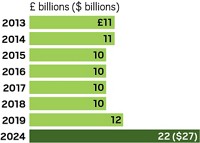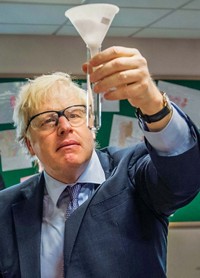Advertisement
Grab your lab coat. Let's get started
Welcome!
Welcome!
Create an account below to get 6 C&EN articles per month, receive newsletters and more - all free.
It seems this is your first time logging in online. Please enter the following information to continue.
As an ACS member you automatically get access to this site. All we need is few more details to create your reading experience.
Not you? Sign in with a different account.
Not you? Sign in with a different account.
ERROR 1
ERROR 1
ERROR 2
ERROR 2
ERROR 2
ERROR 2
ERROR 2
Password and Confirm password must match.
If you have an ACS member number, please enter it here so we can link this account to your membership. (optional)
ERROR 2
ACS values your privacy. By submitting your information, you are gaining access to C&EN and subscribing to our weekly newsletter. We use the information you provide to make your reading experience better, and we will never sell your data to third party members.
Policy
Committed to science
by Bibiana Campos Seijo
July 10, 2017
| A version of this story appeared in
Volume 95, Issue 28
By some accounts, as of the end of June, the lights went out at the White House office of the science division, one of the four subdivisions of the Office of Science & Technology Policy (OSTP). The White House has given no information as to how the tasks that this group was responsible for—including policy issues such as science education, biotechnology, and crisis response—will be handled.
To date, the current Administration has not demonstrated the same level of commitment to science—the closure of the office above is one example—as previous Administrations have. Six months into President Donald J. Trump’s presidency, 85% of the top science jobs in the White House remain unfilled. The Trump Administration has been sluggish to appoint individuals across the board, not just the science-related jobs. But given the budget cuts that Trump has proposed for some science agencies, it is now crucial that people with the right technical expertise are brought in to plan accordingly if Congress approves those cuts.
Nor has there been any news relating to another important role, that of presidential science adviser. That person typically leads OSTP and briefs and advises the President on science and how it applies to policy. At the end of last year—on Nov. 23 to be precise—the leaders of 29 scientific societies representing U.S. science, technology, and education communities, which included ACS as one of the signatories, sent a letter to President Trump urging him to appoint a science adviser. There has been no response so far, but there is still time for Trump to act.
By contrast, I was interested to read about what is happening to the equivalent role in the U.K. In the most recent reshuffling under the Higher Education & Research Act, the chief scientific adviser to the government, Mark Walport (the name may sound familiar, as before 2013 he used to run the Wellcome Trust, one of the largest biomedical research funding bodies in the world), has been appointed to head the U.K. Research & Innovation agency, or UKRI.
This is a new body that will result from the consolidation of the nine founding councils in existence today, which currently operate independently, with each body specializing in a different field.
UKRI will provide strategic oversight and coordinated planning to research in the U.K. The new agency will open for business in April 2018, and by 2020 it is projected to have a turnover of £8 billion annually.
This makes Walport the most important man in U.K. science because, as of next year, he’ll be responsible for all public research spending in the U.K.
One of the greatest challenges for him and his new agency will be to navigate Brexit—the U.K.’s proposed exit from the European Union. According to the BBC, U.K. universities employ about 30,000 scientists from EU countries and receive an estimated £850 million in funding each year from the EU.
To mitigate Brexit’s risk to U.K. science, the U.K. government is making further investments. Jo Johnson, the U.K.’s universities minister, announced only last week the creation of a fund worth £100 million to attract global researchers. This fund is specifically focused to attract “highly skilled early career and senior researchers from the developed world and from emerging research powerhouses such as India, China, Brazil and Mexico.”
Despite the uncertainty, this level of investment in the basic infrastructure and leadership in R&D promises a transformation in the performance of the U.K.’s research and innovation sector. Despite Brexit, the U.K. seems committed to maintaining its global position in science and research.
Views expressed on this page are those of the author and not necessarily those of ACS.





Join the conversation
Contact the reporter
Submit a Letter to the Editor for publication
Engage with us on Twitter